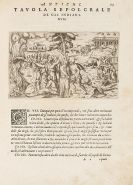
Andreas Vesalius
Brüssel
1514 -
Zakynthos
1564
Andreas Vesalius, also Vesal though originally Witinck, was born on January 1, 1514 in Brussels. His father, personal apothecary to the Hapsburgs, brought Andreas in contact with the field of medicine early.
Andreas Vesalius began his studies of languages and science at the Catholic University in Löwen in 1530 but switched to medicine the next year. While still a student of medicine, he traveled to Paris and Padua in 1533. There he studied primarily galenical (herbal) medicine and anatomy, soon performing dissections.
Vesalius performed his first public dissection in Löwen in 1536. He returned to Padua the next year to do his doctorate at the university there. At the age of 23, he became a professor for surgery in Padua, with teaching duties in anatomy.
In the next five years, Andreas Vesalius produced his lifework. In his anatomical work, "De humani corporis fabrica" ("On the Fabric of the Human Body"), which appeared in 1543, he described how only the human body offered a dependable path to understanding bodily structures.
At this time, he prepared the remains of a criminal, the so-called Vesalian skeleton, which is still preserved in the anatomical collection in Basel.
Furthermore, Vesalius proposed the theory, that humans developed from pygmies, which in turn had developed from apes. In 1544, he became personal physician to the Hapsburgs.
While traveling to Jerusalem, Andreas Vesalius died on October 10, 1564 on the island of Zakynthos.
Would you like to sell a work by Andreas Vesalius?
Infos for seller






